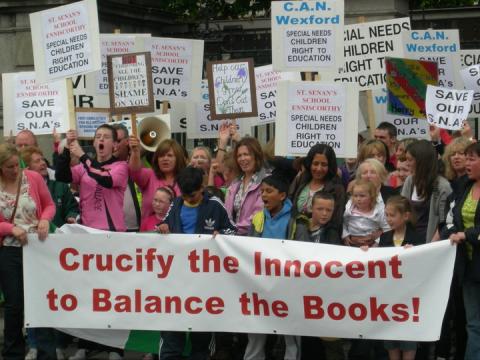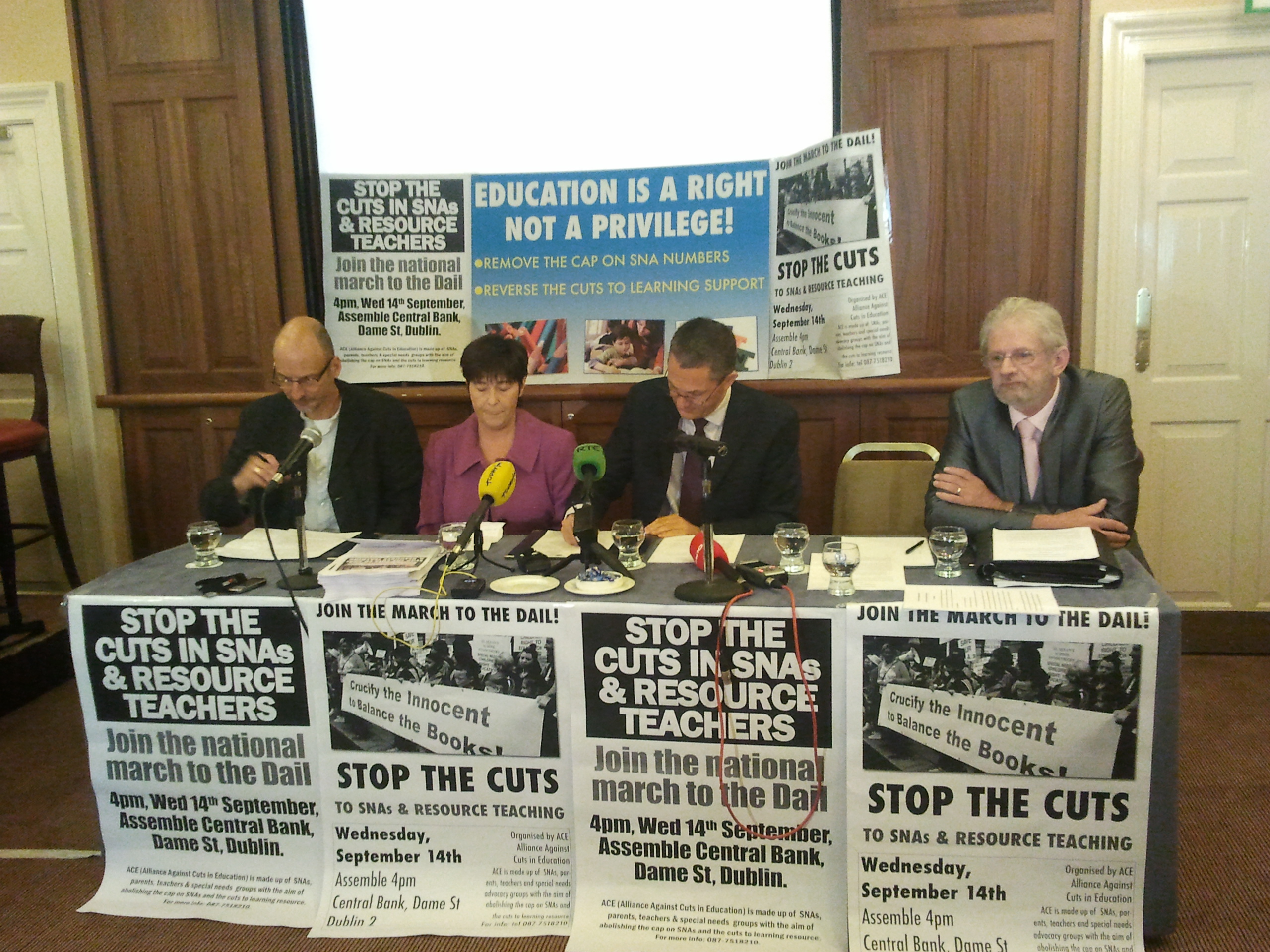'Cruel' cutbacks will cost more in long-term

The breathtaking hypocrisy of the government is matched only by the casual brutality of their attacks on education, a press conference heard yesterday. By Alison Spillane.
Cuts to Special Needs Assistant (SNA) numbers and resource teaching hours were the cruellest and most inhumane cutbacks he had seen in over thirty years of teaching, according to Tomás O'Dúlaing, principal of Griffeen Valley Educate Together in Lucan.
Mr O'Dúlaing was speaking at a press conference called by the newly-formed Alliance against Cuts in Education (A.C.E.) to announce a protest march planned for next Wednesday, 14 September. The demonstration will coincide with the beginning of the new Dáil term and protestors will assemble at the Central Bank from 4pm before proceeding to the gates of Leinster House on Kildare Street.
He said vulnerable children were returning to school this September to find 10% of their one-to-one teaching hours "hacked off" and their SNA support halved or eliminated.
The Department of Education is implementing a cap of 10,575 on the number of SNAs. As the number of full-time SNA posts stood at 10,802 for the 2010/2011 school year this has resulted in the loss of 227 posts. As well as this, Resource Teachers for Travellers have been withdrawn (approximately 600 posts), as have 125 Language Support teachers, 47 rural co-ordinator teaching posts for schools in the Delivering Equality of Opportunity in Schools (DEIS) programme, and 42 Visting Teachers for Travellers posts. Changes to school tranport including increased costs and the possible removal of certain routes have also been introduced.
Also speaking at the conference was Tom Murray, former Chairman of the National Council for Special Education (NCSE), who said the failure to fully implement the Education for Persons with Special Educational Needs Act 2004 represented a denigration of democracy.
The 2004 Act provided for a five year timeframe for the implementation of its provisions following the establishment of the National Council for Special Education. According to this timescale, all provisions should have been implemented by October 2010; instead Budget 2009 deferred indefinitely the full implementation of the Act. The Fianna Fáil/Green Party coaliton committed in the Renewed Programme for Government (October 2009) to identifying and implementing priority aspects of the legislation, however this commitment was never fully realised.
At present, only certain sections have been commenced – principally those concerned with the establishment of the NCSE. There is a commitment in the 2011 Programme for Government to publish a plan for the implementation of the EPSEN Act 2004 but no action has been taken on this to date.
Key sections which have yet to be implemented include the introduction of an Individual Education Plan for each child with special needs and the establishment of an independent appeals process for parents. With regard to the latter, €330,000 has been spent on the establishment of a Special Education Independent Appeals Board but the board has yet to hear any cases.
Under the current system, all dialogue concerning a child's special needs provision is between schools and Special Education Needs Organisers (SENOs) who work for the NCSE. There is no obligation on either a school or the NCSE to inform parents of a SENO's decision about resources for their child. Furthermore, if a parent wishes to appeal the decision of a SENO this appeal can only be made through – and with the cooperation of – the child's school. In response to a parliamentary question on 7 July, however, Minister for Education Ruairi Quinn stated that the existing appeals process has been suspended and replaced by a review process which is even more limited as it removes the right to appeal individual allocation decisions, allowing only for a review of a school's total resources.
 Recently unemployed SNA of seven years Joan Laverty, also speaking yesterday, said it was important for parents to understand that the withdrawal of these supports will affect every child in the class, not just those with special needs.
Recently unemployed SNA of seven years Joan Laverty, also speaking yesterday, said it was important for parents to understand that the withdrawal of these supports will affect every child in the class, not just those with special needs.
Wexford parent Rod Johnstone said there were moral, ethical, social and financial imperatives as to why these cuts should be reversed. Speaking about the latter, he highlighted the short-sighted nature of these measures, saying the cost of institutionalised care these children would need in adulthood if not supported now would be significantly higher than investing in the present. "These children should be allowed to realise their full potential", he said.
Although domestic research is somewhat sparse in this area, international studies have consistently found that investing in young children and providing the necessary supports for those with special needs and learning difficulties results in high economic and social returns in the long-term. The 2011 OECD report Doing Better for Families observed that there is "growing recognition" in both academic and policy circles that investing in young children results in long-term benefits for the children themselves and society as a whole. Professor J.J. Heckmann of the University of Chicago has argued that once a child falls behind, he or she is likely to remain behind, adding "remediation for impoverished early environments becomes progressively more costly the later it is attempted in the life cycle of the child".
A 2009 OECD report entitled Doing Better for Children noted that 20% of Irish public expenditure on children is spent on young children (aged 0-6), compared with 37% on those aged 6-12 and 44% on the later years (12-18).
It has been estimated the government will save around €2.7 million through the removal of the 227 SNA posts, assuming all those unemployed SNAs are entitled to Jobseeker's Benefit. Today, €2.9 million will be paid out to senior unsecured bondholders – not covered by any of the government's guarantee schemes – in Bank of Ireland. Next Thursday, the day after the Dáil returns, senior unsecured bondholders in AIB will be paid a staggering €1.5 billion.
{jathumbnailoff}
Images: Alison Spillane.
